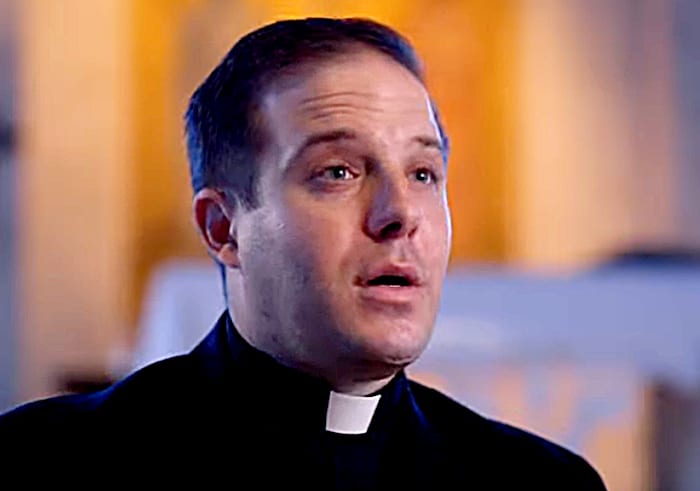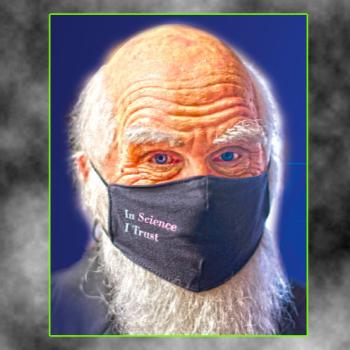
SINCE 2017, when he was ordained, Fr Matthew Hood, above, of the Archdiocese of Detroit, has been doing a whole bunch of priestly things, blissfully unaware that few, if any of them were valid.
Why? Because of a cock-up at his baptism made him ineligible for priestcraft. And virtually everything he did – from confirmations to absolutions – are now deemed invalid.
The Catholic News Agency revealed that alarm bells sounded for Hood after he watched a video of his baptism in which a deacon called Mark Springer said “We baptise you….”
Later, Hood read a notice issued this summer by the Vatican’s Congregation for the Doctrine of the Faith. The note said that changing the words of baptism in certain ways “abused” and “wounded” baptisms and rendered them invalid.
The notice warned that if the person doing the baptising says “We baptise you in the name of the Father and of the Son and of the Holy Spirit,” instead of “I baptise you…” the baptism is not valid.
The congregation noted that it had become aware that people were playing fast and loose with the words, and knew of a number of cases in which baptisms have been administered using the words:
In the name of the father and of the mother, of the godfather and of the godmother, of the grandparents, of the family members, of the friends, in the name of the community we baptise you in the name of the Father and of the Son and of the Holy Spirit.
And it wasn’t having any of it. A note accompanying the Congregation ruling said:
When the minister recites the words, ‘I baptise you… ,’ he does not speak as a functionary who carries out a role entrusted to him, but through his ministry signals the presence of Christ, who acts in his Body to give his grace.
To modify the sacramental formula, the congregation said:
Implies a lack of an understanding of the very nature of the ecclesial ministry that is always at the service of God and his people and not the exercise of a power that goes so far as to manipulate what has been entrusted to the Church in an act that pertains to the tradition.
This sent a “shocked” Hood into a tailspin.
Rather than keep schtum about the baptism blunder, Hood called his archdiocese which indicated that he needed to be re-ordained. But first, he needed to become a Catholic by being baptised.
J D Flynn, reporting for CNA, said:
In short order, he was baptised, confirmed, and received the Eucharist. He made a retreat. He was ordained a deacon. And on August 17, Hood finally became a priest. For Real.
He pointed out that the Archdiocese of Detroit explained in a August 22 letter that people whose marriages were officiated by Hood when he was a non-priest should contact their parish to check on the validity of their nuptials.
Flynn added that the archdiocese also said it was making efforts to contact other people whose baptism had been celebrated by Springer.
He is believed to have invalidly baptised others, during 14 years at St Anastasia Parish in Troy, Michigan, using the same invalid formula.
Confessions will have to be repeated
While absolutions performed by Hood before his valid ordination were not valid, Flynn pointed out that the archdiocese said:
We can be assured that all those who approached Father Hood, in good faith, to make a confession did not walk away without some measure of grace and forgiveness from God.
That said, if you recall any grave (mortal) sins that you would have confessed to Father Hood before he was validly ordained and you have not yet been to a subsequent confession, you must bring them to your next confession explaining to any priest what has happened.
If you cannot remember if you confessed any grave sins, you should bring that fact to your next confession as well. A subsequent absolution will include those sins and will give you peace of mind.
The archdiocese, said Flynn:
Also answered a question it expects many Catholics will be asking: ‘Isn’t it legalistic to say that, even though there was an intention to confer a sacrament, there was no sacrament because different words were used? Won’t God just take care of it?’
In an explanation that left my head reeling, the archdiocese declared:
Theology is a science that studies what God has told us and, when it comes to sacraments, there must not only be the right intention by the minister but also the right ‘matter’ (material) and the right ‘form’ (words/gestures – such as a triple pouring or immersion of water by the one saying the words). If one of those elements is missing, the sacrament is not valid.
As far as God ‘taking care of it,’ we can trust that God will assist those whose hearts are open to Him. However, we can have a much greater degree of confidence by strengthening ourselves with the sacraments He has entrusted to us.
According to the ordinary plan God has established, the Sacraments are necessary for salvation: baptism brings about adoption into the family of God and places sanctifying grace in the soul, since we are not born with it, and the soul needs to have sanctifying grace when it departs from the body in order to spend eternity in heaven.
It’s a grace to realise that God is not a liar. Any experience of the sacraments, even if they were celebrated invalidly, God was still present, and God still honours that. God doesn’t repent of our desire for Him and this call that He’s given to us to follow Him and be faithful to Him.
Note: In the original post several quotes should have been attributed to CNA author J D Flynn. We have now corrected this and offer him an apology.















